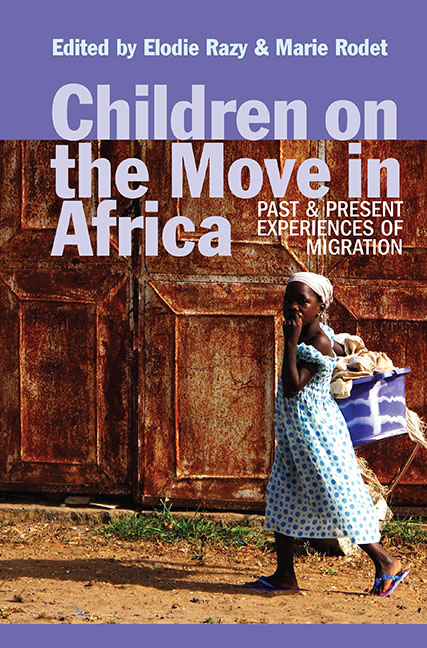Book contents
- Frontmatter
- Contents
- List of Illustrations
- Notes on Contributors
- Preface
- Acknowledgements
- Introduction: Child Migration in Africa: Key Issues & New Perspectives
- Part I CHILD MIGRANTS IN AFRICA: BEYOND THE DILEMMA OF VULNERABILITY v. AGENCY
- Part II BEING A CHILD & BECOMING A GENDERED ADULT: THE CHALLENGES OF MIGRATIONS IN CHILDHOOD
- 3. ‘Bringing a Girl From the Village’: Gender, Child Migration & Domestic Service in Post-colonial Zambia
- 4. ‘I Will Never Become a Crocodile but I am Happy if I Eat Enough’: A Psychological Analysis of Child Fosterage & Resilience in Contemporary Mali
- 5. Working as a ‘Boy’: Labour, Age & Masculinities in Togo, c. 1975–2005
- Part III MOBILITY, IMAGINATION & MAKING NATIONS
- Bibliography
- Index
5. - Working as a ‘Boy’: Labour, Age & Masculinities in Togo, c. 1975–2005
from Part II - BEING A CHILD & BECOMING A GENDERED ADULT: THE CHALLENGES OF MIGRATIONS IN CHILDHOOD
Published online by Cambridge University Press: 25 October 2017
- Frontmatter
- Contents
- List of Illustrations
- Notes on Contributors
- Preface
- Acknowledgements
- Introduction: Child Migration in Africa: Key Issues & New Perspectives
- Part I CHILD MIGRANTS IN AFRICA: BEYOND THE DILEMMA OF VULNERABILITY v. AGENCY
- Part II BEING A CHILD & BECOMING A GENDERED ADULT: THE CHALLENGES OF MIGRATIONS IN CHILDHOOD
- 3. ‘Bringing a Girl From the Village’: Gender, Child Migration & Domestic Service in Post-colonial Zambia
- 4. ‘I Will Never Become a Crocodile but I am Happy if I Eat Enough’: A Psychological Analysis of Child Fosterage & Resilience in Contemporary Mali
- 5. Working as a ‘Boy’: Labour, Age & Masculinities in Togo, c. 1975–2005
- Part III MOBILITY, IMAGINATION & MAKING NATIONS
- Bibliography
- Index
Summary
A large number of historical and anthropological studies have shown that in several African contexts being a ‘boy’, a ‘youth’ or a ‘child’ (or, conversely, being an ‘adult’, a ‘man’ or an ‘elder’) has less to do with age than with status and social hierarchies. Becoming an ‘adult man’ (and later an ‘elder’) is not a ‘natural’ process: it is a fluid, socially constructed and contested arena where a plurality of models of masculinity and adulthood are renegotiated by individuals in different power positions. The study of how African men have struggled in different historical contexts to embody, maintain or reshape different models of adulthood and masculinity is part of a more general, anti-essentialist perspective that analyses the cultural and historical constructions of gendered identities and social inequalities.
Migration and work have often played key roles in the achievement of the social and cultural markers that have historically been attributed to adulthood in many African countries, and they have become crucial elements in local processes of growing up and in the social shaping of gendered identities. Yet transitions to adulthood during migratory trajectories are neither linear nor uncontested: often young male migrants must face processes of infantilization and emasculation, particularly when they are exposed to exploitative labour relations. For many of them, migration is often the context where not only employment situations and working conditions, but also the dominant markers of adulthood and masculinity must be renegotiated.
The infantilization and emasculation of subordinates is indeed a recurrent theme in the literature, emerging historically as it did as one of the main forms of legitimization of the social, political and economic control that elders and masters struggled to maintain over young people and slaves. Despite the formal abolition of slavery, the infantilization of subordinates also characterized colonial administrators’ attitudes towards African men. As Rich has shown, ‘the English word boy … became part of the colonial African French lexicon … the term was often applied to adult African male servants’. During the colonial period, being a ‘boy’ meant being a servant, a social minor economically dependent on a master, someone unable to provide for himself: in a nutshell not a ‘real man’.
- Type
- Chapter
- Information
- Children on the Move in AfricaPast and Present Experiences of Migration, pp. 104 - 122Publisher: Boydell & BrewerPrint publication year: 2016

